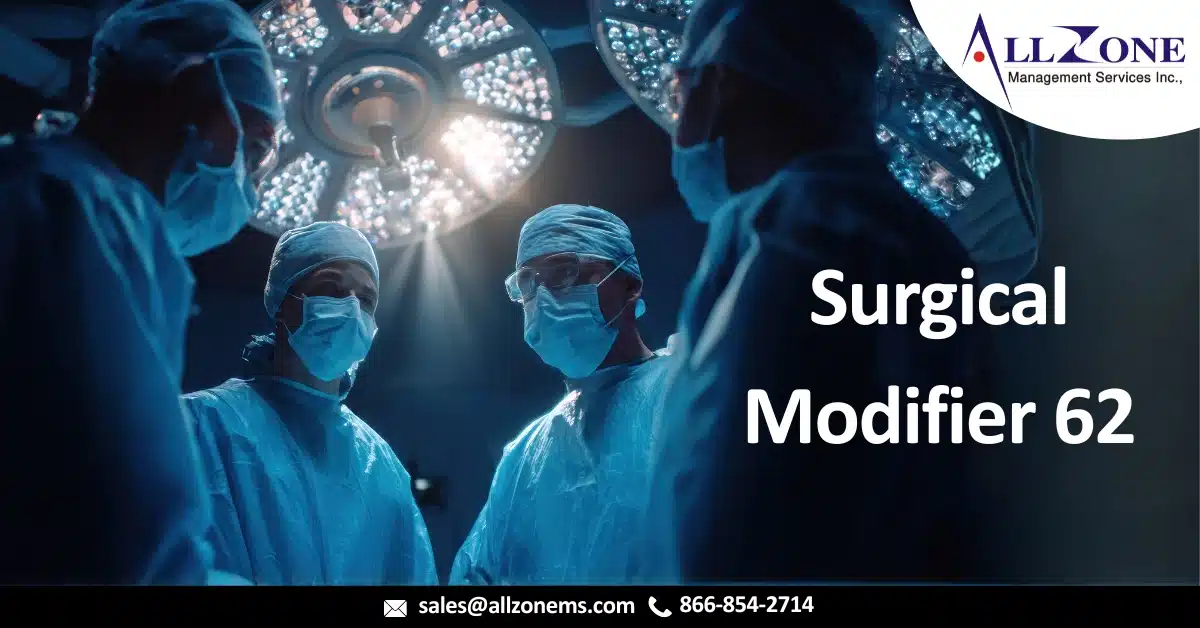Surgical procedures often involve complex teamwork between multiple physicians. In such cases, accurate billing and coding are essential to ensure proper reimbursement for each provider’s contribution. One of the most commonly used modifiers for these collaborative surgeries is Modifier 62. Understanding its correct usage is critical to avoid claim denials, underpayments, or compliance issues.
In this complete guide, we’ll explore everything you need to know about Surgical Modifier 62, its purpose, documentation requirements, billing guidelines, and how Allzone’s surgical billing services can help your practice achieve precision and profitability.
What Is Surgical Modifier 62?
Modifier 62 is used to indicate that two surgeons worked together as co-surgeons to perform distinct parts of the same surgical procedure. Both surgeons are considered primary, and each performs a significant portion of the work that requires distinct skills.
In simple terms, this modifier is reported when a single complex surgical procedure requires the expertise of two qualified surgeons, rather than an assistant or a team.
CPT Definition:
“When two surgeons (usually with different expertise) work together as primary surgeons performing distinct parts of a procedure, each surgeon should report the procedure with Modifier 62.”
When Should Modifier 62 Be Used?
Modifier 62 should be applied only under specific conditions. Both surgeons must:
- Be of different specialties – for example, a neurosurgeon and an orthopedic surgeon performing a spinal fusion together.
- Perform separate parts of the same procedure, not simply assist each other.
- Provide individual operative reports detailing the portion of the surgery they performed.
- Bill for the same CPT code using Modifier 62.
If these conditions aren’t met, payers may deny the claim or request further documentation.
When Not to Use Modifier 62
Incorrect use of Modifier 62 is a common cause of claim denials. Avoid using it when:
- One surgeon is assisting the other (use Modifier 80 or 81 instead).
- The surgeons are performing different procedures (each should bill their respective CPT codes).
- The payer does not recognize Modifier 62 for that specific CPT code (check the Medicare Physician Fee Schedule).
- The documentation doesn’t clearly define each surgeon’s distinct role.
Documentation Requirements
Proper documentation is vital when using Modifier 62. Each surgeon involved must submit:
- Separate operative reports clearly describing:
- The part of the surgery performed.
- The level of involvement and expertise required.
- Any overlapping or independent portions.
- Signatures from both surgeons to authenticate the report.
- Procedure details matching the CPT code billed by both providers.
Without comprehensive documentation, payers like Medicare or private insurers may reject or downcode the claim.
Reimbursement Guidelines for Modifier 62
When both surgeons bill the same CPT code with Modifier 62:
- Each surgeon typically receives 62.5% of the standard fee schedule amount.
- Medicare and most commercial payers apply this rate since both surgeons share primary responsibility.
- Both claims must include the same CPT code and Modifier 62 to ensure proper processing.
However, reimbursement can vary among payers, so checking the payer’s policy before submission is always wise.
Common Errors Leading to Denials
Even experienced billing teams can make mistakes when applying Modifier 62. Here are common pitfalls:
- Inadequate documentation – missing or unclear operative notes.
- Incorrect modifier pairing – using Modifier 62 when an assistant surgeon (Modifier 80) is appropriate.
- Unsupported CPT codes – not all procedures allow co-surgeons.
- Payer-specific rules ignored – failing to verify if the insurer recognizes Modifier 62.
- Duplicate billing – both surgeons billing for the same procedure without proper justification.
To minimize these errors, partnering with a specialized surgical billing company like Allzone ensures every claim meets compliance and payer-specific criteria.
Real-World Example
Scenario:
A patient undergoes complex spinal reconstruction. Both a neurosurgeon and an orthopedic surgeon perform distinct portions of the operation.
- Both surgeons bill CPT 22843 (Posterior segmental instrumentation).
- Each surgeon attaches Modifier 62.
- Both submit individual operative notes detailing their unique roles.
Outcome:
Each surgeon receives 62.5% of the allowable fee — avoiding denials and ensuring compliant billing.
Payer-Specific Considerations
Different payers have unique rules for Modifier 62:
- Medicare: Requires both surgeons to document their individual contributions and use the same CPT code.
- Commercial Payers: Some may require prior authorization or additional documentation.
- Workers’ Compensation/VA Claims: Often need detailed justification for co-surgeon necessity.
Before claim submission, always confirm CPT codes eligible for Modifier 62 under the payer’s fee schedule.
How Allzone’s Surgical Billing Services Ensure Accuracy
At Allzone Management Services, we understand the complexity behind surgical billing — especially when it involves multiple surgeons and modifiers. Our team of certified medical coders and billing experts ensures precision in applying Modifier 62 and other surgical modifiers to maximize revenue and minimize rejections.
Here’s how Allzone can help:
- Comprehensive Code Review: Our coders verify CPT codes, cross-check payer rules, and ensure correct modifier application.
- Accurate Documentation Audits: We review operative reports to ensure they meet payer compliance and support Modifier 62 usage.
- Denial Prevention: With advanced AI-driven claim scrubbing, we identify potential issues before submission.
- Payer Policy Updates: Our billing specialists stay updated with payer-specific changes to ensure consistent reimbursement.
- Faster Payments & Reduced A/R Days: Optimized claim submission and follow-up processes ensure faster collections and fewer payment delays.
By partnering with Allzone, surgical practices gain the confidence that every co-surgeon procedure is billed accurately and compliantly.
Conclusion
Modifier 62 plays a crucial role in surgical billing when two surgeons collaborate on a complex procedure. However, incorrect usage or missing documentation can quickly lead to claim rejections and revenue loss.
By understanding its proper application — and leveraging professional Medical billing services like those offered by Allzone — healthcare providers can ensure accurate reimbursement, streamlined workflows, and full compliance with payer regulations.
Allzone simplifies surgical billing, empowering practices to focus on patient care while we handle the complexities of coding and compliance.

